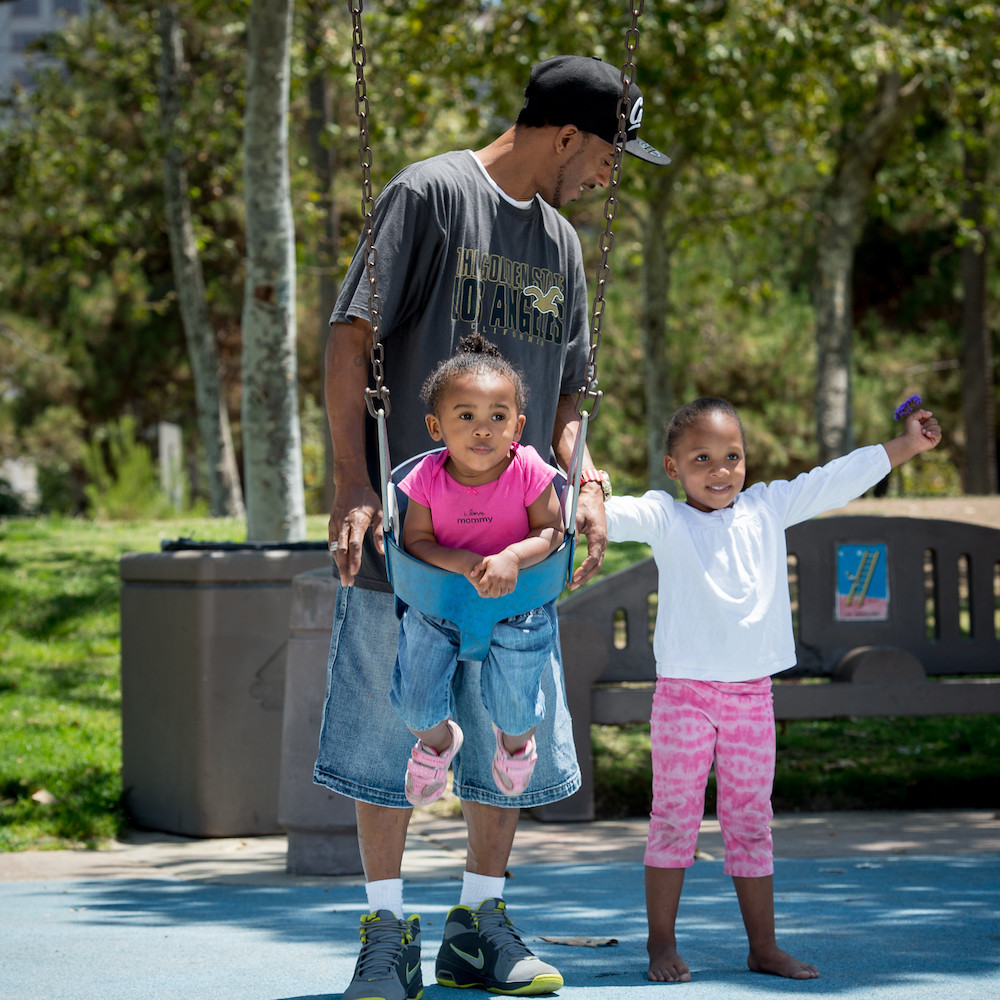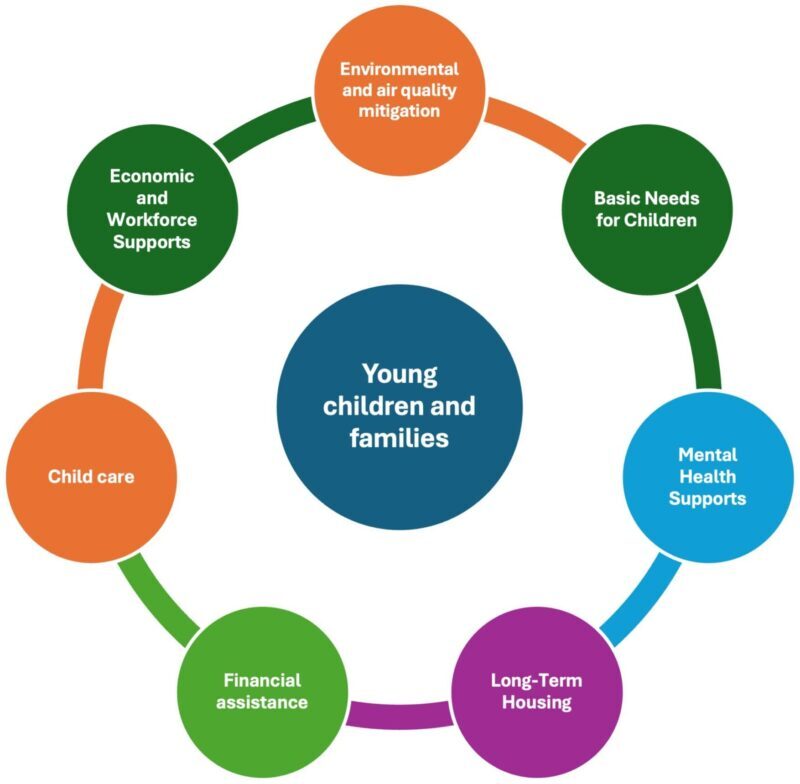September 29, 2022
(Special Thanks to First 5 LA Senior Data Strategist Agnieszka Rykaczewska and Senior Program Officer Kevin Dieterle for their help with the survey)
Two years after the onset of COVID-19, a majority of parents of young children in Los Angeles County said the pandemic has caused their child to fall behind in learning and progress, affected their child’s health and influenced their child’s emotions or behavior, according to a recent survey of 269 parents conducted for First 5 LA.
Nearly all of the parents surveyed reported that they struggled during the pandemic, with stress and anxiety impacting them the most. More than half suffered a loss of job or income.
Even as the World Health Organization said this month that the end is “in sight” for COVID-19, we are only just beginning to understand how the pandemic has impacted young children and their families.
To better understand this impact, First 5 LA commissioned its first survey taking the pulse of L.A. County parents with young children two years after the outbreak of the pandemic. Family Survey Results: Parenting Young Children Through The COVID-19 Pandemic was conducted by VIVA Social Impact Partners during six weeks from March to May 2022. Parents of children who were age 5 or younger at the start of the pandemic were surveyed. (See “About This Survey” below for more details).
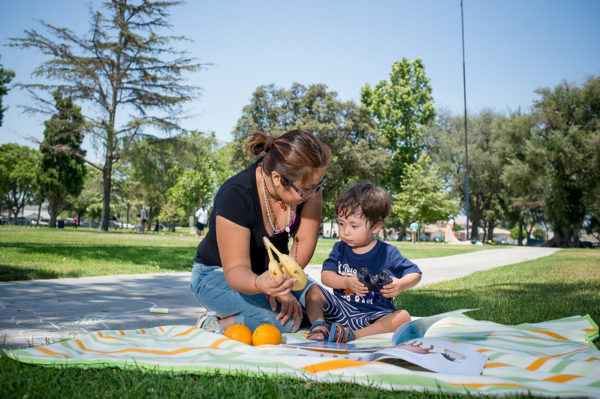 “We now have a generation of children who started their lives in a pandemic or attended virtual school, were isolated and experienced various stressors and losses, and parents who experienced an increased amount of grief and loss and anxiety in navigating this new norm,” said Sharlene Gozalians, director of LA Best Babies Network. “This survey gives more insight to what we can expect for the next decade in terms of impact due to COVID.”
“We now have a generation of children who started their lives in a pandemic or attended virtual school, were isolated and experienced various stressors and losses, and parents who experienced an increased amount of grief and loss and anxiety in navigating this new norm,” said Sharlene Gozalians, director of LA Best Babies Network. “This survey gives more insight to what we can expect for the next decade in terms of impact due to COVID.”
Gozalians was one of the early childhood professionals in L.A. County asked to weigh in on the survey results, including experts in the fields of health and development, early learning, family supports, home visiting and public policy.
Some expressed alarm, others were “heartbroken” and many saw the findings as a useful tool in modifying programs, developing more effective strategies and bolstering systems of support for families with young children in the wake of the pandemic.
 “The findings are an opportunity to learn more from a group of parents that are not often surveyed and can help organizations better understand challenges and find more effective strategies and approaches for supporting parents with younger children,” said First 5 LA Director of Family Supports Diana Careaga.
“The findings are an opportunity to learn more from a group of parents that are not often surveyed and can help organizations better understand challenges and find more effective strategies and approaches for supporting parents with younger children,” said First 5 LA Director of Family Supports Diana Careaga.
The survey featured 17 questions encompassing areas affecting early childhood and/or parenting, such as physical and mental health, learning and progress, emotions and behavior, family challenges, childhood development, developmental delays and financial stability.
“We know that supports for families of young children have been inadequate and hard to navigate even prior to the onset of COVID-19,” said First 5 LA Chief Government Affairs Officer Charna Widby. “The pandemic not only highlighted the existing system shortfalls, but it also exacerbated existing disparities further. This survey highlights that parents still need more and better supports.”
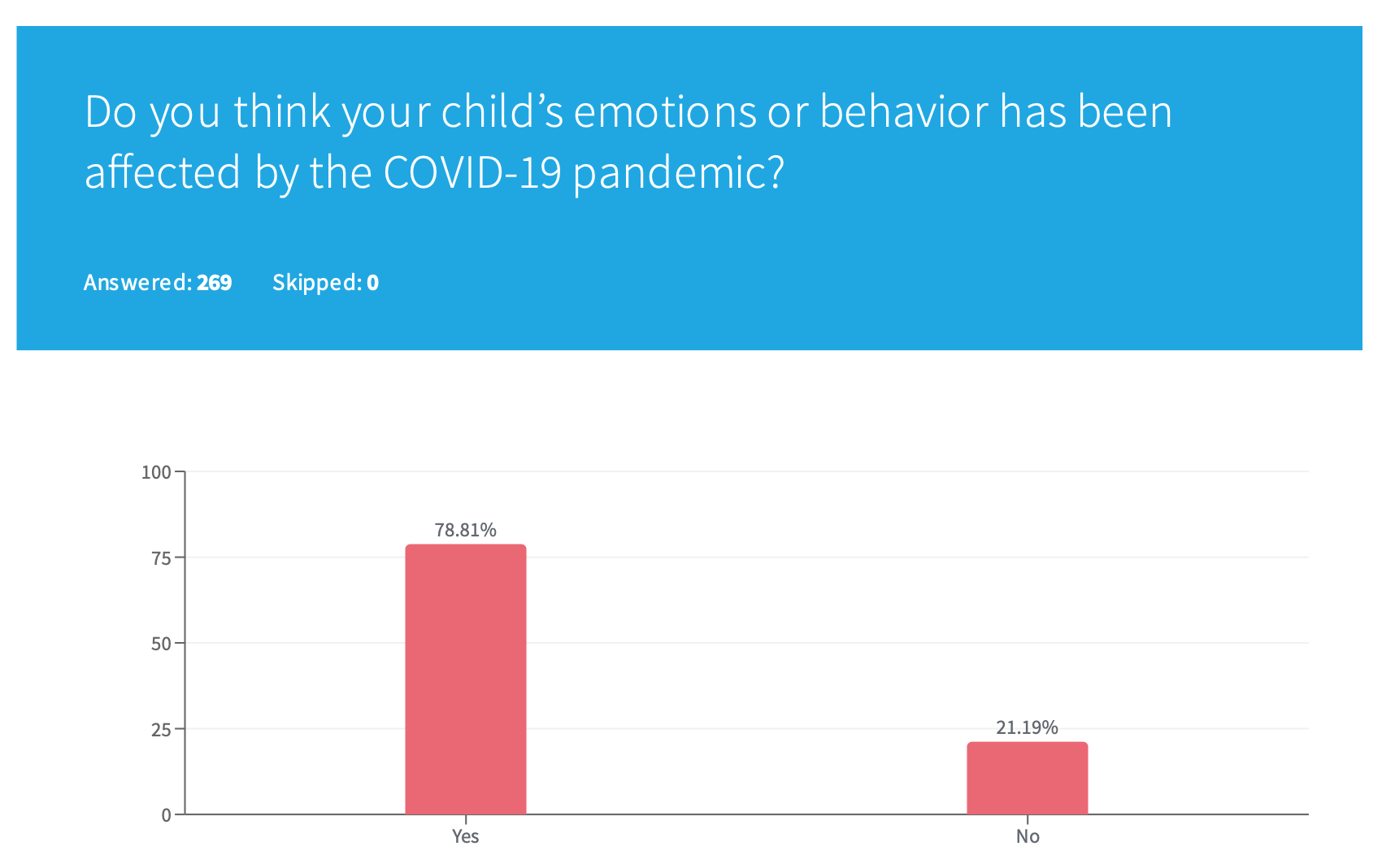
Key Findings – Learning and Progress, Emotions and Behavior
As many young children in L.A. County enter the classroom this fall – some for the first time since the beginning of the pandemic – the results of the survey illuminate potential challenges with learning, socializing with classmates and getting along with their teachers.
For example:
- 52 percent of parents surveyed think their child has fallen behind in their learning and progress
Additionally, the survey revealed:
- Nearly 8 in 10 (79 percent) of parents think their child’s emotions or behavior has been affected by the pandemic.
Of these parents*,
- Almost half (45 percent) said their child had more difficulty playing/getting along with other children
- Nearly 1 in 3 (29 percent) said their child had more difficulty with parents or teachers
- 25 percent said their child was more scared
- 19 percent said their child was more angry
- 16 percent said their child was more sad
*parents could select more than one answer
“Families are uniquely attuned to the needs of the children in their care, so while I am not surprised that over half of respondents reported feeling that their children had fallen behind in their learning, it is a fairly alarming finding,” said First 5 LA Early Care and Education Senior Program Officer Kevin Dieterle.
 “Many of the parents’ responses are heartbreaking, but not surprising, as this data echoes anecdotal evidence we’ve been hearing from families throughout the pandemic,” said First 5 LA Commissioner Maricela Ramirez, who serves as the chief education officer for the Los Angeles County Office of Education. “Young children gain so much from their early learning experiences, especially in their social-emotional and behavioral development.”
“Many of the parents’ responses are heartbreaking, but not surprising, as this data echoes anecdotal evidence we’ve been hearing from families throughout the pandemic,” said First 5 LA Commissioner Maricela Ramirez, who serves as the chief education officer for the Los Angeles County Office of Education. “Young children gain so much from their early learning experiences, especially in their social-emotional and behavioral development.”
“Socio-emotional learning that occurs in early learning environments is a critical component of early learning,” Dieterle added. “For many families, the pandemic disrupted their children’s ability to engage with their peers and our survey findings indicate that there were negative consequences on their children’s social-emotional development.”
While some early learning professionals and researchers have raised concerns about COVID-19’s impact on young children’s socio-emotional skills needed for classroom success, the survey results can provide insights that allow programs and services — both with First 5 LA and its partners — to adjust to the needs and challenges that have surfaced during the pandemic.
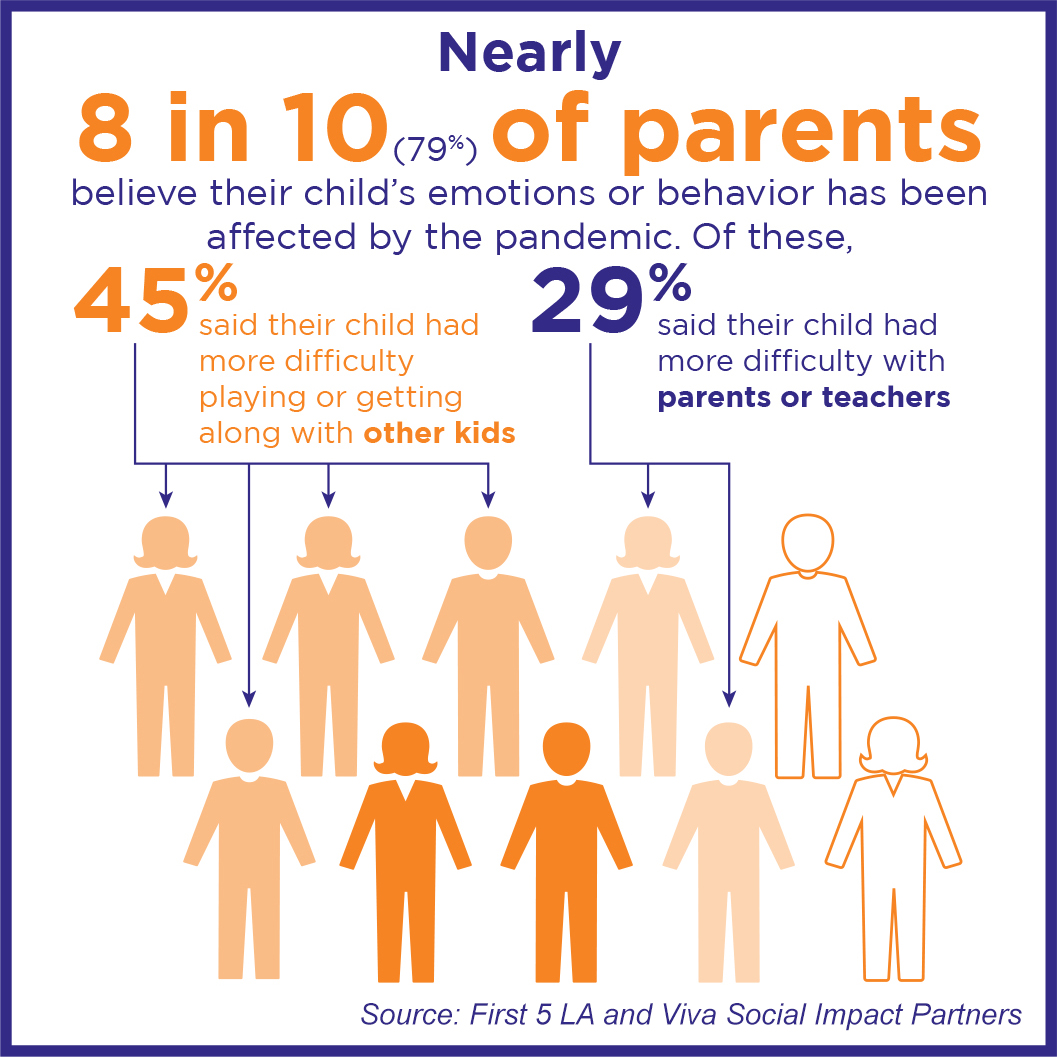 “It’s important to point to this data to help direct resources to programs and services to support families that have struggled raising their young children so that their school journey begins strongly,” said Francisco Oaxaca, chief of communications and community relations for L.A. Care Health Plan.
“It’s important to point to this data to help direct resources to programs and services to support families that have struggled raising their young children so that their school journey begins strongly,” said Francisco Oaxaca, chief of communications and community relations for L.A. Care Health Plan.
One such family support that could benefit from the data is home visiting, a voluntary program funded by First 5 LA that matches expectant and new parents with trained professionals who provide family-centered mentoring to help parents access resources, develop support systems and improve parenting knowledge and skills.
“The data can also provide home visitors with broader insights to what parents may be facing and help them initiate conversations that explore these topics in more depth to ensure they are identifying and meeting family needs,” said Careaga, whose team oversees First 5 LA’s home visiting efforts. “For example, the results indicated 45 percent of parents felt their children had more difficulty playing or getting along with other children. Home visitors can focus in on ways to promote opportunities for safe interactions and suggestions to address parents’ concerns.”
(Editor’s note: Click here to read a single mother’s concern about her daughter falling behind in preschool after struggling to find early learning during the pandemic.)
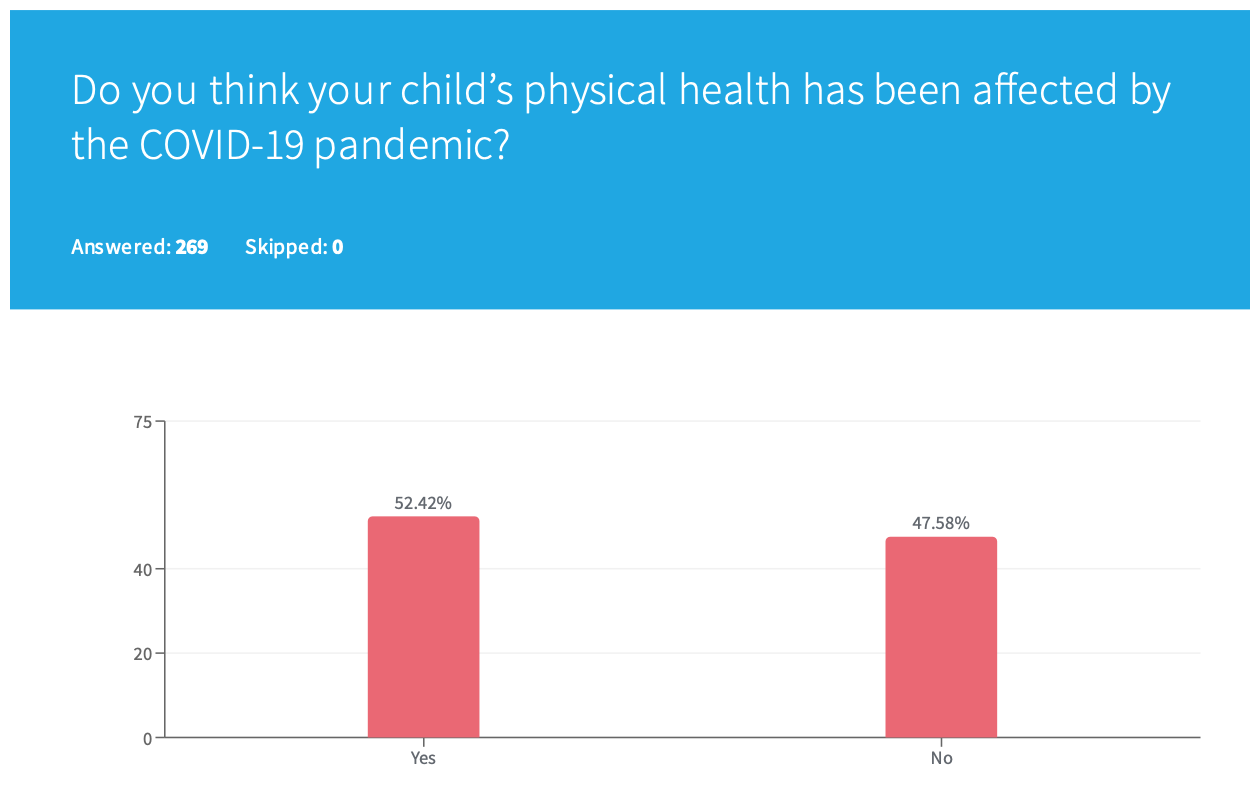
Key Findings: Physical Health
More than half (52 percent) of parents said their child’s physical health has been affected by the COVID-19 pandemic.
Of these parents*,
- More than 3 out of 4 (78 percent) said their child had less exercise/physical activity
- More than 1 in 3 (38 percent) said they did not take their child to “well child visits” such as doctor/dentist/vision exams
- About 1 in 3 (34 percent) said their child got COVID-19
*parents could select more than one option
 First 5 LA Health Systems Senior Program Officer Cristina Peña noted how the data regarding well child visits could inform the work of Help Me Grow LA, which helps L.A. County families find services that can support their child’s development.
First 5 LA Health Systems Senior Program Officer Cristina Peña noted how the data regarding well child visits could inform the work of Help Me Grow LA, which helps L.A. County families find services that can support their child’s development.
“This is data that aligns with other sources and is important for our Help Me Grow work as developmental screening for delays and important conversations with health care providers occurs at these well child visits. Meaning if families aren’t attending these visits, monitoring and support for children’s development isn’t happening,” Peña said. “I think it could further inform our HMG (Help Me Grow) outreach and communication strategies by encouraging families to schedule and complete these visits . . . knowing there may have been a gap between their last visit.”
Oaxaca noted how the data could be useful in L.A. Care’s work.
“I see an opportunity to work with pediatricians in our provider network to focus on families with pre-school age children and help them identify the negative effects of the pandemic,” Oaxaca said. “Pediatricians can provide guidance on how to help those children recover from those effects and refer families to organizations that are providing specific resources that can support them.”
(Editor’s Note: Read here about a young girl’s ongoing symptoms following her COVID-19 infection.)
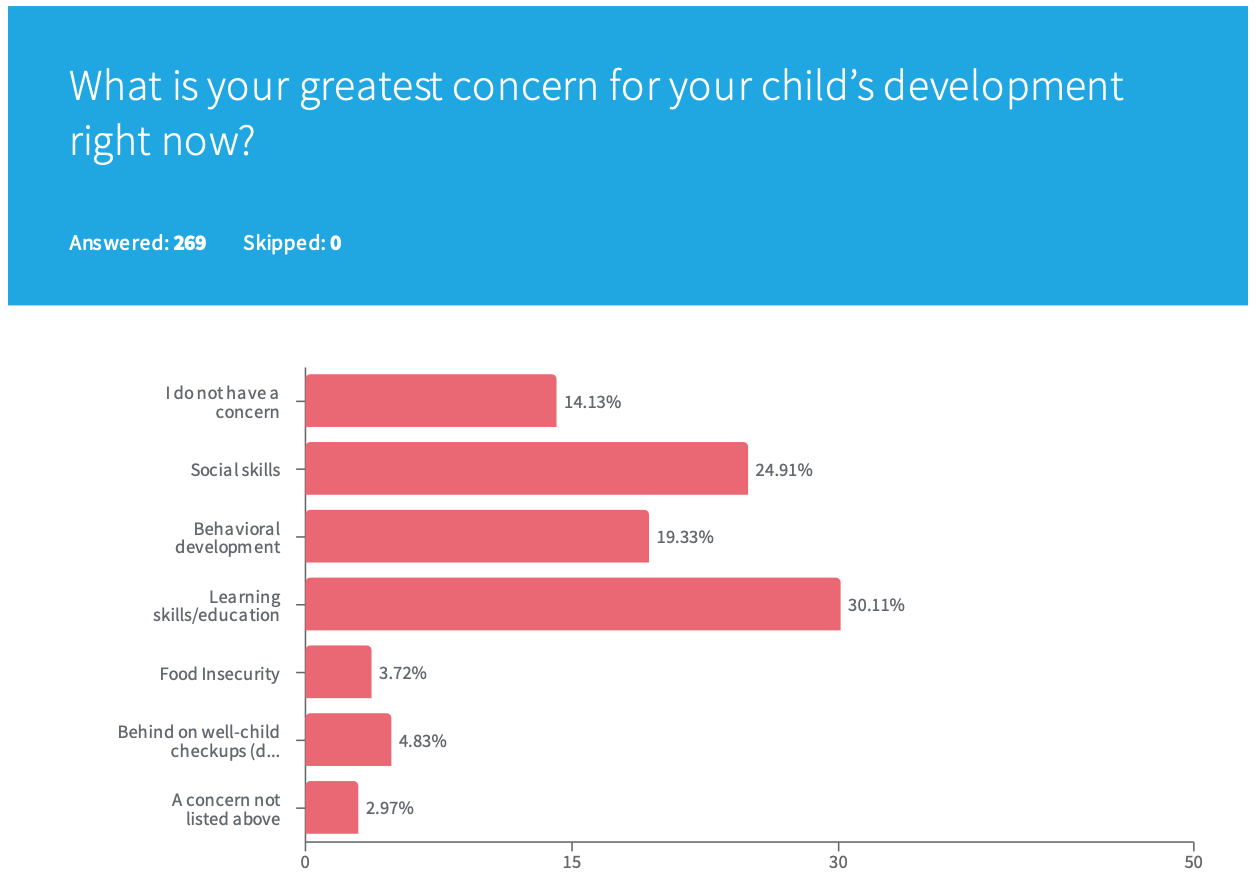
Key Findings: Concern for Child’s Development
The survey showed shifting parental concerns for their children prior to and two years into the pandemic:
- 42 percent of parents reported they did not have a concern for their child’s development prior to the pandemic
- Now only 14 percent of parents can afford that luxury
Of those parents who cited their greatest concern for their child’s development:
- Topping the list is learning skills/education (30 percent), up from 25 percent from before the pandemic
- Social skills ranked second, rising from 17 percent prior to the pandemic to 25 percent now
- Behavioral development ranked third, but had the highest jump – nearly doubling from 10 percent prior to the pandemic to 19 percent now
“Classroom experiences with highly trained educators among their peers let children explore their world, build social skills and begin developing their tools for learning,” Ramirez said. “When so many lost this opportunity during a historically stressful and traumatizing time, it’s no surprise that 79 percent of parents saw changes in their children’s emotions and behavior or that parental concerns about behavioral development doubled.”
“I think it is also noteworthy that while a strong plurality (42 percent) did not have concerns about their children’s development before the pandemic, nearly one third (30 percent) of respondents reported being concerned about their children’s learning skills now,” Dieterle said. “This change indicates that many young children were adversely impacted by the pandemic in ways noticeable enough that their parents now express concern where none existed before.”
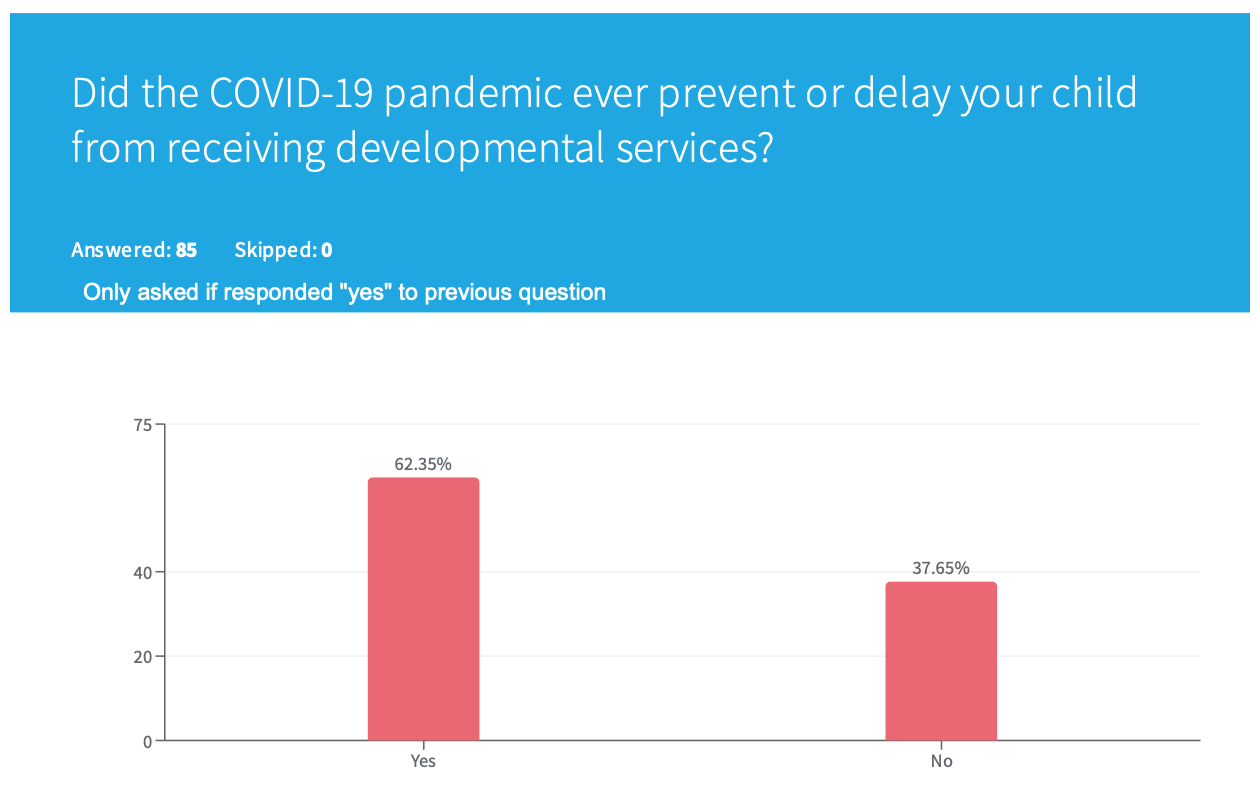
Key Findings: Developmental Delays and Support
According to a report by Brown University, some babies born during the pandemic are experiencing developmental delays and disruptions, including “significantly reduced verbal, motor and cognitive performance as compared to children born pre-pandemic.”
About 1 in 4 children aged 5 and under are at risk for a developmental delay, which can include a need for developmental support services such as speech therapy, physical or occupational therapy, hearing or vision services or social skills support. A child may also have an Individualized Education Program (IEP) or an Individualized Family Service Plan (IFSP).
Asked in the survey if they had a young child receiving such developmental services,
- 32 percent of parents said yes
Of those parents,
- 62 percent said the COVID-19 pandemic prevented or delayed their child from receiving developmental services
“It’s especially unfortunate that 62 percent of families experienced delays receiving developmental support services,” said Ramirez.
“(The survey result) aligns with what we were learning from partners early in the pandemic when many supportive services had to limit seeing families, especially in person, and virtual services were not ideal for developmental support,” Peña said. “From my understanding, all previous virtual services are now back to in person.”
Peña also noted a correlation between survey results regarding developmental delays and parent concerns.
“While 42 percent of respondents indicated they didn’t have a concern for their child’s development before the pandemic, only 14 percent of respondents reported still not having a concern for their child’s development now, illustrating a large increase in elevated concerns with learning skills/education, social skills and behavioral development listed as the top three developmental concerns now, years into dealing with COVID,” Peña said. “To me this finding connects to survey questions (about developmental support services) and further reinforces the importance and need to help families easily access developmental services and supports for their children as early as possible, or when a concern first arises.”
(Editor’s Note: Click here to read the story of a homeless mom who struggled to get speech therapy for her children during the pandemic.)
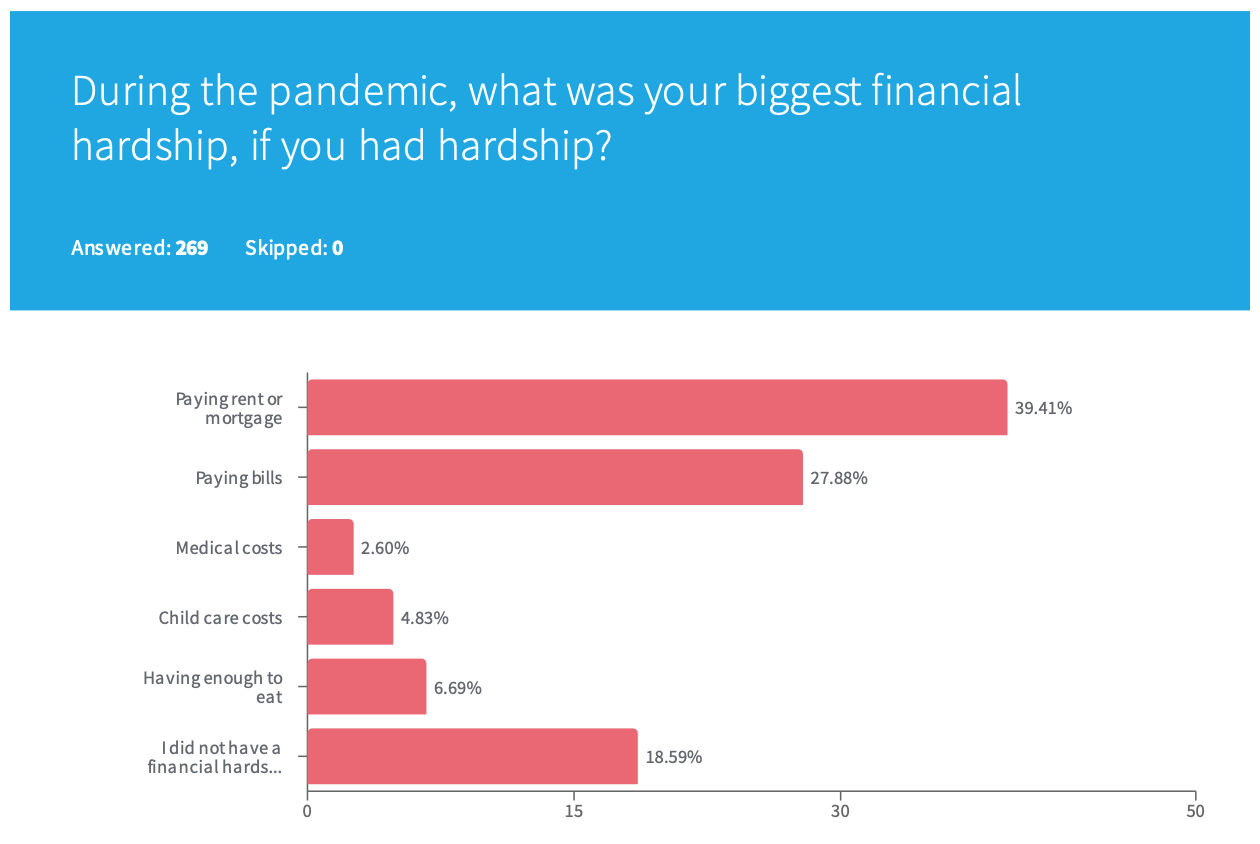
Key Findings: Financial Hardship
While many socio-economic issues and disparities affecting parents with young children existed prior to COVID-19, the pandemic exacerbated them. Perhaps nowhere was this more apparent than in the financial fragility exposed in several of the survey questions.
Asked to identify their biggest financial hardship during the pandemic (if they had one), parents said:
- Paying rent or mortgage was the top answer, garnering 39 percent
- Paying bills ranked second, at 28 percent
- Having enough to eat was reported by 7 percent
- 19 percent said they did not have a financial hardship during the pandemic
During the pandemic, the federal child tax credit of 2021 provided monthly payments of up to $300 per child up to the age of 17 to families with qualifying incomes – for a total of $3,000 to $3,600 per child. It was the largest child tax credit in history and expired in 2021.
According to the survey:
- 71 percent of parents reported receiving the monthly Child Tax Credit of up to $300 per child
Of those parents*,
- 73 percent spent at least part of the monthly payment on food
- 52 percent spent at least part of the monthly payment on rent or mortgage
- 46 percent spent at least part of the monthly payment on utilities, tied with spending on clothes
- 27 percent spent at least part of the monthly payment paying down existing debt
*parents could select more than one option
Dieterle put some of these numbers — and their respective disparities — into perspective.
 “Even before the pandemic, over 70 percent of Angelenos were rent burdened, spending over 30 percent of their income on rent and utilities. Nearly half were considered “severely rent burdened,” spending over 50 percent of income on rent and utilities. The same study reported that Latino and Black families were more likely to be rent burdened compared to white and Asian families,” Dieterle said. “Other data corroborates these findings, further finding that the lower the household income, the more likely the family was to be rent burdened.”
“Even before the pandemic, over 70 percent of Angelenos were rent burdened, spending over 30 percent of their income on rent and utilities. Nearly half were considered “severely rent burdened,” spending over 50 percent of income on rent and utilities. The same study reported that Latino and Black families were more likely to be rent burdened compared to white and Asian families,” Dieterle said. “Other data corroborates these findings, further finding that the lower the household income, the more likely the family was to be rent burdened.”
Added Dieterle: “This context is important because understanding the economic straits families in L.A. County were in before the pandemic really underscores how much more unstable and precarious the pandemic caused many families’ economic situations to be.”
“Certainly, our sample in this survey also reflected that economic fragility, with 45 percent of respondents (who received the $300 child tax credit) reporting a household income of less than $35,000 annually. In fact, only 17 percent of respondents (who received the $300 child tax credit) reported family incomes exceeding $50,000/year.”
Additionally, Dieterle pointed out, more than 50 percent of all parents surveyed reported loss of job/income as a result of the pandemic (see Family and Parental Challenge Findings, below).
“This indicates that families on the economic margins were hit extremely hard by the pandemic,” Dieterle said.
According to one study conducted during the pandemic, Latinos experienced the highest prevalence of food insecurity (40 percent) from April to December 2020, followed by African Americans (39 percent), Asians (28 percent), and whites (21 percent). Half, or 50.3 percent, of adults who experienced food insecurity between April to July 2020 had children in their households and 35.6 percent were single parents.
Meanwhile, food prices keep soaring with rising inflation while 60 percent of Americans saw a rent increase in the last year, prompting fears about being able to pay for housing.
“The economic fragility that many L.A. County families have experienced has the capacity to snowball into circumstances that can be particularly devastating to families with young children,” Dieterle said.
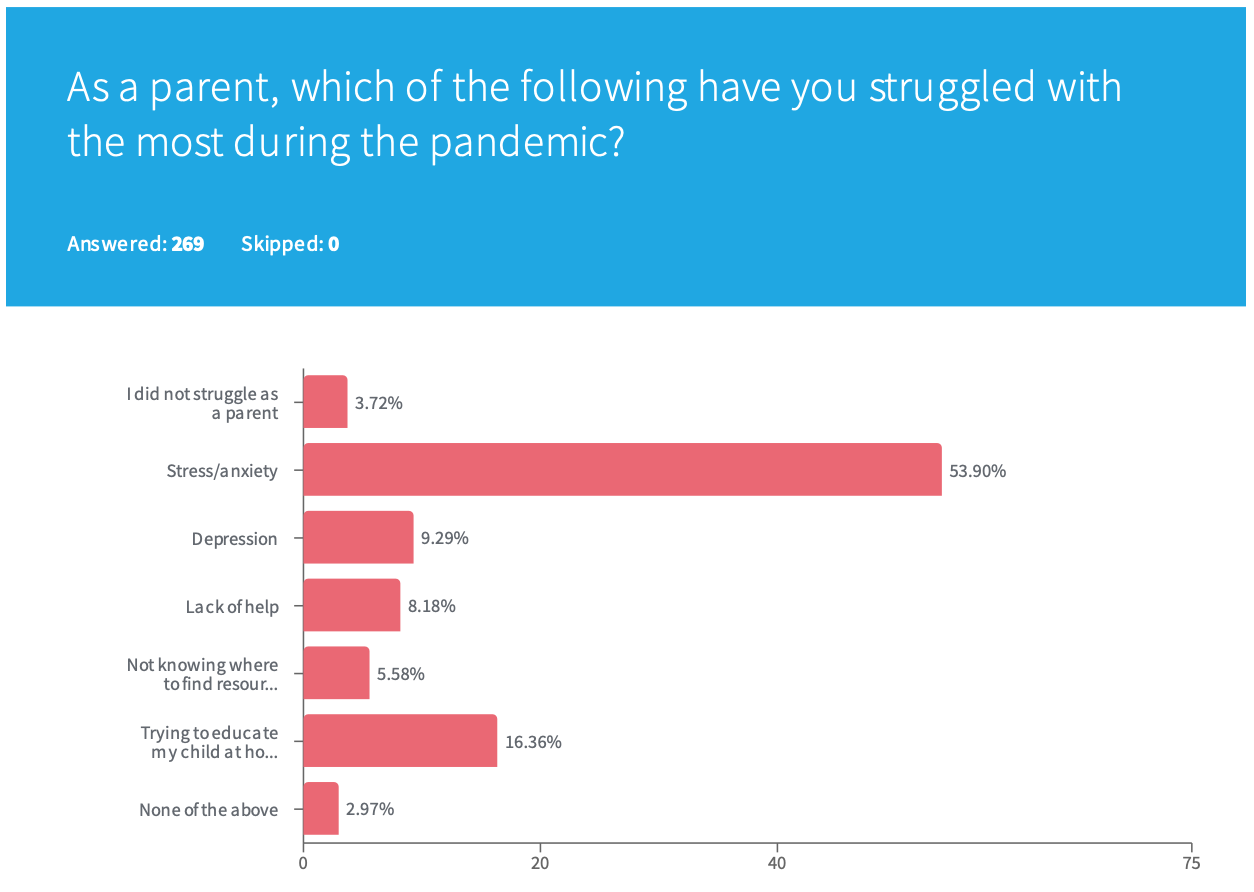
Key Findings: Family and Parental Challenges
When asked which challenges they faced as a family during the pandemic, parents could choose more than one option. Their choices reflected the pandemic’s impact on their family’s foundation.
Loss of job/income (54 percent) and mental health (52 percent) represented the top two challenges to their family.
Additionally, 28 percent of L.A. County families were challenged in terms of family stability, parents reported.
“A pivotal and foundational time for children and families was rattled,” Gozalians said. “The data gives us more insight of where we may need to adjust our program, curriculum, resources and training – a well-supported and trained workforce is essential to ensuring families are able to overcome their individual challenges, increase family empowerment and efficacy and feel connected and resilient in the process.”
When parents were asked what they personally struggled with the most during the pandemic,
- more than half of parents (54 percent) said stress/anxiety
- 9 percent said depression
Overall, nearly every parent (96 percent) said they struggled during the pandemic
These mental health challenges mirrored state and national trends, including a rise in postpartum depression and mood disorders among new parents. One report found that anxiety and depression among California children spiked by 70 percent from 2016 to 2020 when the pandemic ushered in lockdown orders and school closures. And one of the biggest concerns for children heading back to school is how the pandemic has affected their mental health.
Despite these trends, a Senate report found that more than half of Americans who need mental health care do not receive it, with higher rates for minorities. Mental health care practitioners report increased demand for their services during the pandemic, yet 65 percent of psychologists say that they are unable to take new patients.
“The survey findings help elevate and reinforces that parents across the county are experiencing similar challenges,” Careaga said. “This type of information provides organizations and those working with families’ insights as to the types of needs and information and guidance that may support parents. If we know parents are challenged by stress or access to mental health services, then we know that highlighting social support strategies is as critical as working to better connect families to services.”
“We need to think deeply about how we can support the conditions that enable responsible caregiving,” Dieterle said. “A parent experiencing the chronic stress of poverty, food insecurity, job insecurity, etc. is likely going to face challenges in providing responsive care for their children.”
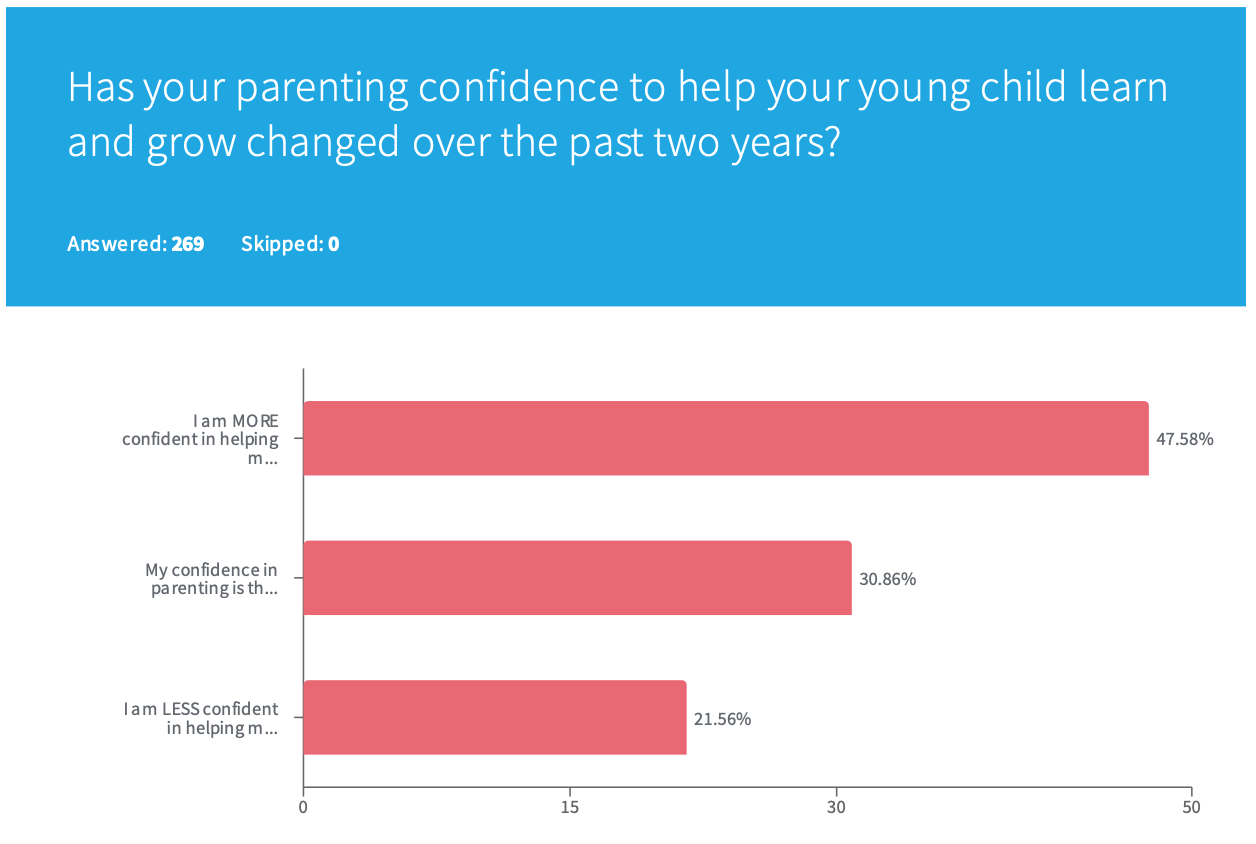
A Few Good Signs
Some positive findings surfaced in the survey, as well.
“Other findings really showcased the resilience of families,” Dieterle said.
Of those parents who reported their child’s emotions or behavior affected by the pandemic:
- 30 percent said their child was happier from spending more time at home with parents/caregivers
At the same time,
- nearly half of parents (48 percent) reported feeling more confident in helping their child grow and learn during the past two years
“Parental engagement is proven to be an integral contributor to early childhood development and success in school and this could be a positive outcome,” Oaxaca said.
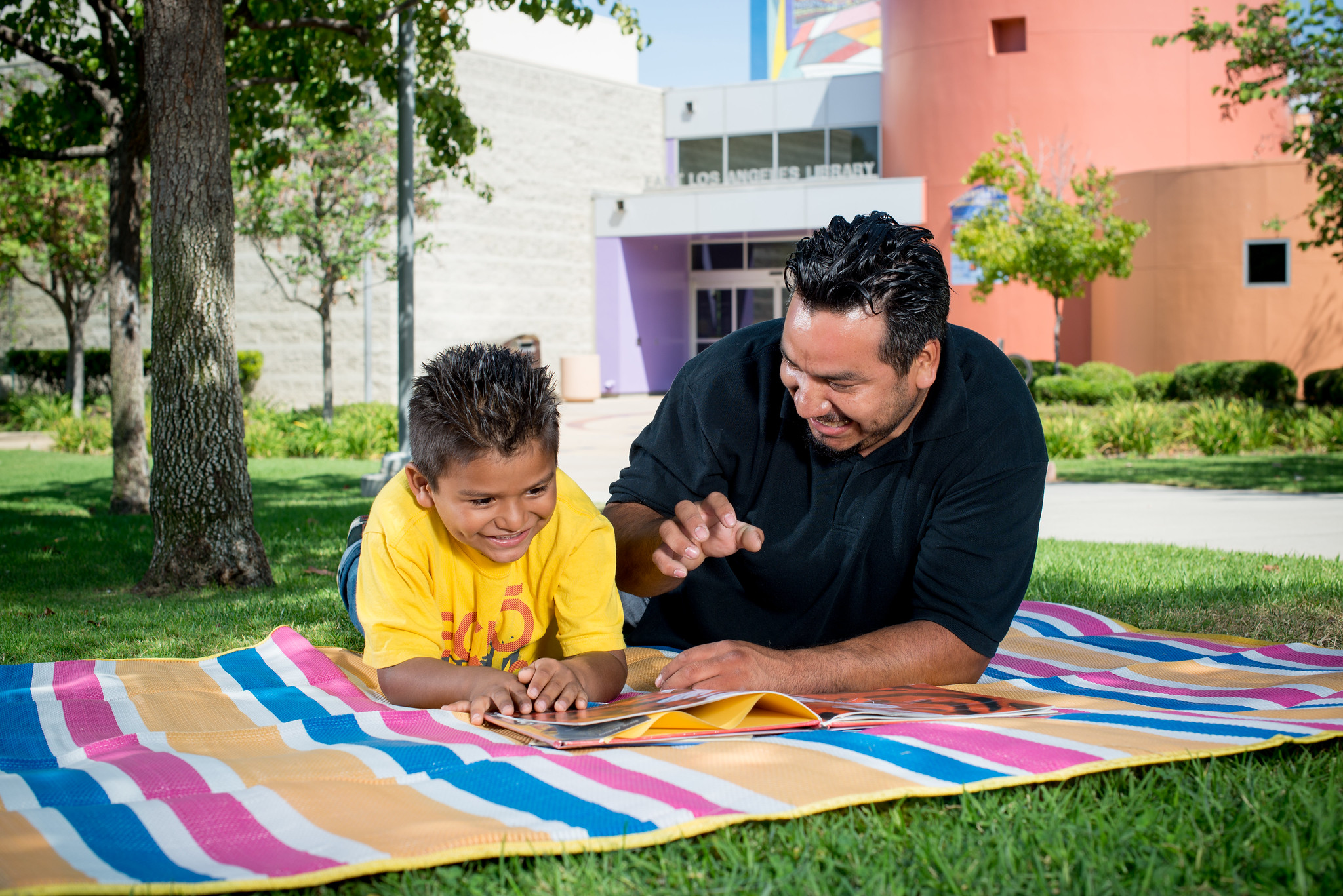
Conclusion
Researchers nationally say data is still needed on the long-term ramifications of the pandemic’s impact on families with young children. Meanwhile, surveys like this can shine a spotlight on the situation in L.A. County.
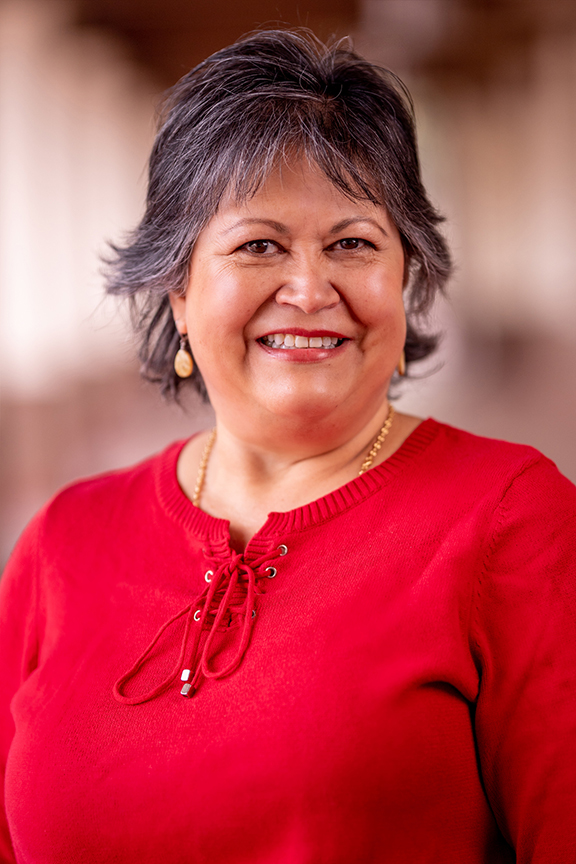 “Research like this is beginning to unpack the long-term effects of the pandemic and how it will impact young children,” said First 5 LA Marketing Manager Violet Gonzalez. “As First 5 LA continues to focus on policy and system change, having this type of understanding is helpful.”
“Research like this is beginning to unpack the long-term effects of the pandemic and how it will impact young children,” said First 5 LA Marketing Manager Violet Gonzalez. “As First 5 LA continues to focus on policy and system change, having this type of understanding is helpful.”
“I do see this data as very useful, and I am grateful to the First 5 staff who conducted the survey and all the parents who responded,” said Ramirez. “I would like to see this information help policy makers understand the value of services provided by early educators, and the full extent of what is lost when children cannot access early learning opportunities. This understanding should inform all decisions affecting educators, children and families, who all deserve our unwavering, uninterrupted support.”
“The results can serve as an extremely useful tool for adjusting programs to address lack of socialization and developmental delays due to the pandemic,” Oaxaca said. “This pandemic has not required children to have been infected by COVID to have been affected negatively (by COVID).”
“This pandemic directly contributed to a growing number of Adverse Childhood Experiences for our under 18 population,” Gozalians said. “The results loudly speak to the need for an expansion of services, especially focused on trauma informed practices and mental health, such as home visiting. As we move through this, families are going to need more support. Families who previously may have not tapped into home visiting, may begin to engage because of the support it provides. The data and survey also speak to the need to cross collaborate with other systems such as hospitals, school districts and direct medical providers.”
“Children have been impacted by the pandemic in so many ways, as the findings point out,” said Cristina Alvarado, executive director of Child Care Alliance of Los Angeles. “It is imperative that we sharpen our focus on supporting children, families, child care providers and teachers in a way that does not return to business as usual.”
Said Peña: “The survey findings offer valuable information for our Help Me Grow LA efforts and other key partners s supporting early childhood development to consider in a post-COVID lockdown landscape and can aid in informing program design and outreach to ensure all families have access to not only services and supports for their child’s developmental health but also to address social determinants of health.”
“To me, these findings are an affirmation that systems change work is the right direction for our work,” Dieterle said. “How can we fortify existing systems to meet the needs of families? How can we improve families’ interactions with these systems? How can we eliminate racial and linguistic disparities experienced navigating these systems?”
About This Survey
Family Survey Results: Parenting Young Children Through the COVID-19 Pandemic was conducted by VIVA Social Impact Partners for First 5 LA. Families Together for Kids in LA County is an early childhood survey panel that gathers essential information on the needs, development, behaviors, and well-being of children and their families in L.A. County. Families Together was developed to center parent voices during planning and decision-making of Quality Start Los Angeles as well as other First 5 LA efforts. Of the 269 parents who completed the survey, nearly all (95 percent) were women and the majority (76 percent) identified themselves as Hispanic, Latino or Latinx. The survey was administered in English and Spanish and offered through text message and email. Home languages for those completing the survey were self-identified as 38 percent bilingual (Spanish/English), 31 percent monolingual Spanish, 21 percent monolingual English, and 10 percent other languages.
